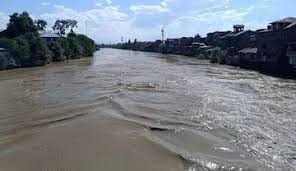
Seeks transparent action
The Environmental Policy Group (EPG) has welcomed the directions of the High Court of Jammu & Kashmir and Ladakh, which have asked the Divisional Commissioner Kashmir to submit an Action Taken Report (ATR) by October 28 on the group’s flood prevention recommendations submitted in an ongoing Public Interest Litigation (PIL).
EPG Convenor Faiz Ahmad Bakshi hailed the court’s intervention as a vital step toward ensuring accountability and scientific evaluation of flood management efforts in the Kashmir Valley.
“The Valley remains highly vulnerable to floods. The court’s directive reaffirms the need for sustainable, transparent, and expert-driven action,” Bakshi said.
He recalled that on September 7, the EPG submitted a detailed report based on expert inputs and field assessments. The report, presented before the court through Amicus Curiae Advocate Nadeem Qadri and EPG’s legal counsel Advocate Shafqat Nazir, highlighted structural deficiencies, environmental degradation, and governance lapses that continue to endanger the region despite the devastating 2014 floods.
The report emphasized the need for:
Third-party inspection of all temporary and permanent flood control works
Public transparency on the current flow capacity of River Jhelum, its tributaries, and the Flood Spill Channel (FSC)
Clear timelines and accountability on Phases I, II, and III of the flood mitigation project
The EPG flagged concerns over the large public expenditure on flood management, stating that past audits have raised serious concerns about quality and impact.
The group also called for urgent action on:
Stopping untreated sewage discharge into the Jhelum and its tributaries
Reconnecting wetlands and traditional water channels that once acted as natural flood buffers
Implementing the Integrated Management Action Plan (2022–2027) for wetlands such as Hokersar, Khushalsar, Hygam, Mirgund, and Pampore Wetlands
Bakshi called the court's directive a “ray of hope,” stressing that floods are often man-made disasters, exacerbated by negligence, encroachment, and poor planning.
The EPG reaffirmed its commitment to support the administration in restoring Kashmir’s ecological balance and protecting lives, urging timely, expert-led, and community-focused implementation of flood prevention measures.
Seeks transparent action
The Environmental Policy Group (EPG) has welcomed the directions of the High Court of Jammu & Kashmir and Ladakh, which have asked the Divisional Commissioner Kashmir to submit an Action Taken Report (ATR) by October 28 on the group’s flood prevention recommendations submitted in an ongoing Public Interest Litigation (PIL).
EPG Convenor Faiz Ahmad Bakshi hailed the court’s intervention as a vital step toward ensuring accountability and scientific evaluation of flood management efforts in the Kashmir Valley.
“The Valley remains highly vulnerable to floods. The court’s directive reaffirms the need for sustainable, transparent, and expert-driven action,” Bakshi said.
He recalled that on September 7, the EPG submitted a detailed report based on expert inputs and field assessments. The report, presented before the court through Amicus Curiae Advocate Nadeem Qadri and EPG’s legal counsel Advocate Shafqat Nazir, highlighted structural deficiencies, environmental degradation, and governance lapses that continue to endanger the region despite the devastating 2014 floods.
The report emphasized the need for:
Third-party inspection of all temporary and permanent flood control works
Public transparency on the current flow capacity of River Jhelum, its tributaries, and the Flood Spill Channel (FSC)
Clear timelines and accountability on Phases I, II, and III of the flood mitigation project
The EPG flagged concerns over the large public expenditure on flood management, stating that past audits have raised serious concerns about quality and impact.
The group also called for urgent action on:
Stopping untreated sewage discharge into the Jhelum and its tributaries
Reconnecting wetlands and traditional water channels that once acted as natural flood buffers
Implementing the Integrated Management Action Plan (2022–2027) for wetlands such as Hokersar, Khushalsar, Hygam, Mirgund, and Pampore Wetlands
Bakshi called the court's directive a “ray of hope,” stressing that floods are often man-made disasters, exacerbated by negligence, encroachment, and poor planning.
The EPG reaffirmed its commitment to support the administration in restoring Kashmir’s ecological balance and protecting lives, urging timely, expert-led, and community-focused implementation of flood prevention measures.
© Copyright 2023 brighterkashmir.com All Rights Reserved. Quantum Technologies